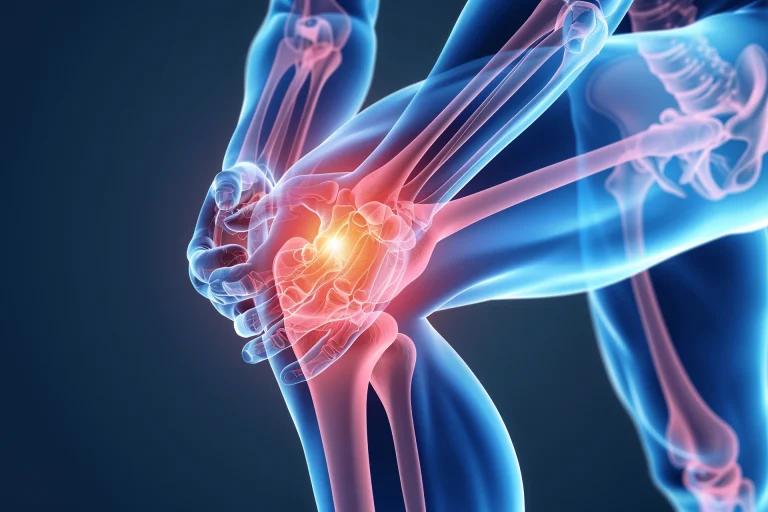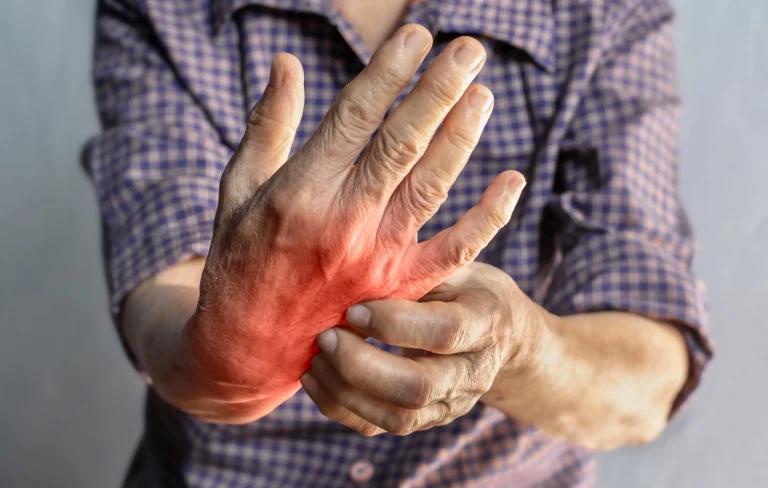If you have a family history of arthritis, you may be wondering what exactly causes this painful and often debilitating condition. In this blog post, we’ll explore the risk factors and possible triggers that can contribute to the development of arthritis. Our goal is to help you gain a better understanding of this complex condition so that you can take steps to manage your symptoms and maintain your quality of life.
What is arthritis?
Arthritis is an inflammatory disease that occurs when the immune system attacks the body’s tissues. Specifically, the antibodies that normally protect us from infection and disease mistakenly attack the joints, leading to inflammation and joint damage. This can cause a range of symptoms, including pain, stiffness, and swelling in the affected joints.
Arthritis falls within a broader category of musculoskeletal and rheumatic diseases, which can also affect other parts of the body, such as the bones, muscles, and connective tissues. From osteoarthritis to rheumatoid arthritis and psoriatic arthritis, every type of arthritis can impact the quality of life in people of all ages. While there is no known cure for arthritis, there are many treatment options available to help manage symptoms and improve quality of life. These may include medications such as biologics, physical therapy, and lifestyle changes.
There are different causes and risk factors for arthritis. Some of the common risk factors for arthritis include age, gender, family history of arthritis and obesity.
In some cases, bacterial or viral infections can trigger the development of certain types of arthritis. Joint injuries may also increase the risk of developing osteoarthritis in that area later on in life. It’s important to understand these possible triggers for arthritis to take preventative measures if necessary. Maintaining a healthy weight, getting enough sleep and managing stress are ways to help reduce the prevalence of inflammation associated with some forms of arthritis.
Risk factors for arthritis
Arthritis is a common condition that affects millions of people worldwide. Though it can be caused by various factors, certain factors increase the risk of rheumatoid arthritis. Here are some key risk factors:
- Age: As we grow older, our bones and cartilage become weaker and more prone to damage
- Gender: Women tend to develop rheumatoid arthritis (RA) more often than men do
- Obesity: Excess weight puts additional pressure on joints, leading to increased wear and tear
Other potential risk factors for arthritis include genetics, joint injuries, infections (bacterial microbes or viral), smoking, stress, sleep disturbances, and environmental factors such as pollution. If you have a family history of arthritis or any of these other risk factors apply to you, it’s essential to pay attention to your joint health and take steps to manage your symptoms before they worsen.
Genetics and arthritis
A family history of arthritis can be a significant risk factor for developing this condition. Inherited genes associated with arthritis can increase the likelihood of its development, especially in individuals over the age of 50. Although not all people with a family history will develop arthritis, awareness and regular check-ups can help catch early symptoms and manage any potential risks. Family history is a significant risk factor for arthritis; however, regular check-ups and awareness can help manage potential risks.
It’s important to note that genetics alone do not determine an individual’s risk for developing arthritis. Environmental factors such as obesity, smoking, stress, sleep disturbances and viral or bacterial infections may also contribute to its onset or flares. Understanding these possible triggers along with genetic predisposition is crucial in managing one’s overall joint health and preventing future disease activity.
Possible triggers for arthritis
Stressful life events and poor diet choices are two possible triggers for arthritis pain. Stress can lead to inflammation in the body, which can cause pain and stiffness in the joints. Additionally, a poor diet lacking essential nutrients may lead to obesity and increase stress on joints such as the knees.
Environmental factors may also play a role in triggering arthritis symptoms, along with family history and age. While bacterial or viral infections can sometimes trigger rheumatoid arthritis flares, osteoarthritis is generally caused by wear and tear on bone and cartilage over time. Regardless of the specific causes, seeking appropriate treatments, prioritising sleep and reducing stress levels through healthy lifestyle choices may help manage symptom severity and the incidence rate for those living with this challenging condition.`
Inflammation and arthritis
Chronic inflammation in the body can lead to various health issues, including arthritis. Inflammation is part of the body’s response to injury or infection, but when it becomes chronic, it can damage tissues and organs over time. Autoimmune diseases are a common cause of arthritis as they attack joint tissues, leading to pain, stiffness and swelling.
Arthritis risk factors include age, obesity and family history. Women are more likely than men to develop rheumatoid arthritis (RA). It commonly comes on during periods of hormonal change for women, such as after giving birth or the onset of menopause.
Smoking and stress may also increase the risk of developing RA flares. Treatments for arthritis focus on managing symptoms including pain relief through medication or physical therapy such as exercise, that can improve flexibility in joints like knees affected by osteoarthritis.
Getting enough sleep as well so that your immune system can function properly helps fight off bacterial or viral infections, which could worsen symptoms associated with an autoimmune disorder like RA.
Research suggests that carrying too much body weight, a body mass index (BMI) of 25 or more, may increase the risk of RA in those who are genetically susceptible, particularly women.
Joint injuries and arthritis
Joint injuries are a common cause of arthritis. Trauma or injury to a joint can damage the cartilage, bone, and surrounding tissues leading to inflammation and pain. Repetitive stress on joints from work or sports activities is also a risk factor for developing osteoarthritis, which commonly affects the knee joint.
If you have a family history of arthritis or other risk factors such as obesity, smoking, age, gender, and sleep disturbances it’s important to take steps to prevent joint injuries. Maintain a healthy weight through exercise and diet; use proper techniques during physical activity; take breaks when doing repetitive tasks; wear protective gear while playing sports like helmets and pads; avoid smoking as it increases inflammation in the body and can worsen arthritis symptoms; get enough restful sleep each night, which helps reduce stress levels that may contribute to flare-ups of rheumatoid arthritis (RA) symptoms. Seeking prompt treatment for any infections including viral or bacterial ones is key as well, since these can trigger RA flares, by activating immune cells in your body that attack healthy tissue around affected joints.
Infections and arthritis
Bacterial, viral, or fungal infections can trigger the immune system to attack the body’s tissues and cause arthritis. Gastrointestinal infections that lead to an immune system response are particularly common culprits in this regard. Infections that may cause arthritis include Lyme disease, hepatitis C virus (HCV), salmonella, chlamydia and mycobacteria.
Symptoms like joint pain and stiffness usually appear within a few weeks after infection with some bacteria or viruses, causing inflammation of joints leading to rheumatoid arthritis (RA) or osteoarthritis (OA). Other risk factors such as age, smoking or obesity could also contribute towards flare ups of symptoms.
Environmental factors and arthritis
Exposure to pollutants or toxins and cigarette smoking are two environmental factors that have been linked to an increased risk of developing arthritis. Pollutants and toxins can cause inflammation in the body, which can damage joints and lead to pain and stiffness. Similarly, cigarette smoke contains harmful chemicals that can trigger an immune response, leading to joint inflammation.
Studies suggest that exposure to these environmental factors may be particularly harmful to individuals with a family history of arthritis or those who already have symptoms. People at higher risk of developing arthritis need to try and reduce their exposure by avoiding pollution hotspots where possible, quitting smoking if they do smoke, and choosing natural cleaning products over harsh chemicals when cleaning their homes.
Conclusion
In conclusion, understanding the risk factors and possible triggers of arthritis is crucial for managing symptoms and preventing flare ups. Family history and genetics play a significant role in developing certain types of arthritis such as RA, while obesity, smoking, stress, lack of sleep, joint injuries, and bacterial or viral infections can also increase the risk. Environmental factors may also contribute to inflammation in the joints leading to osteoarthritis. It’s important to work with a healthcare provider to develop an effective treatment plan for arthritis care, that addresses both symptom management and potential causes. Always check with your doctor, rheumatology nurse specialist, or pharmacist if you’re not sure how to manage your condition.
Sources
- Living with arthritis – NHS
- About arthritis – Arthritis Foundation
- Slowing Osteoarthritis Progression – Arthritis Foundation
- The future of joint repair – Arthritis Foundation
Medical Disclaimer
NowPatient has taken all reasonable steps to ensure that all material is factually accurate, complete, and current. However, the knowledge and experience of a qualified healthcare professional should always be sought after instead of using the information on this page. Before taking any drug, you should always speak to your doctor or another qualified healthcare provider.
The information provided here about medications is subject to change and is not meant to include all uses, precautions, warnings, directions, drug interactions, allergic reactions, or negative effects. The absence of warnings or other information for a particular medication does not imply that the medication or medication combination is appropriate for all patients or for all possible purposes.








